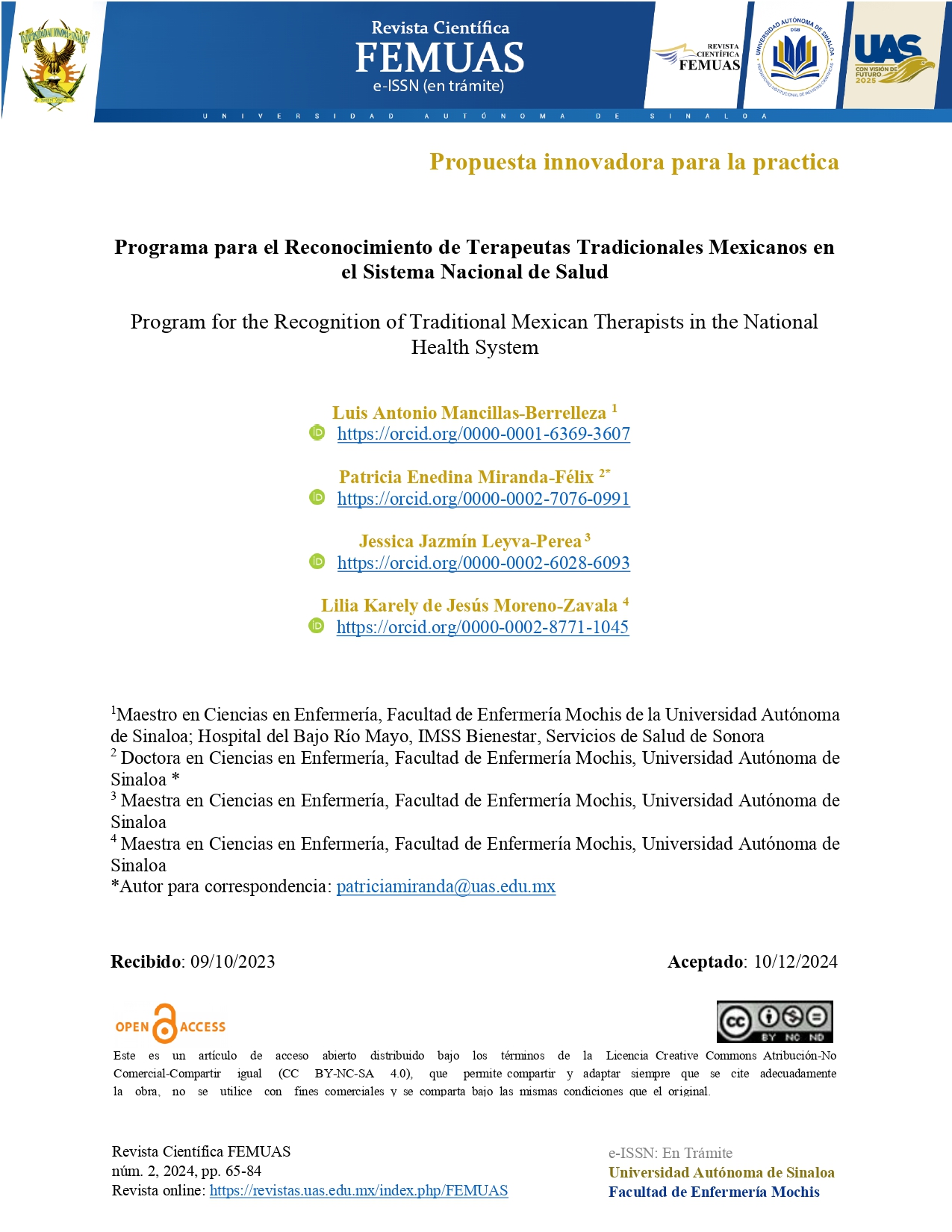Program for the Recognition of Traditional Mexican Therapists in the National Health System
Keywords:
Traditional Medicine, Culturally Competent Health Care, MexicoAbstract
Introduction: Introduction: Traditional medicine (TM) is an ancestral practice used globally to preserve health and treat diseases. This text addresses the relevance of TM in different countries, highlighting the need for public policies for its regulation and integration into health systems. In Mexico, cultural diversity has given rise to Traditional Mexican Medicine (TM), where traditional therapists play a crucial role in health care. However, the recognition and inclusion of TMM in the national health system (NHS) is progressing slowly. Objective: to propose a program for the recognition of Traditional Mexican therapists in the SNS for the practice of TMM. Methodology: the proposed steps for social impact projects allow for strategies based on a solid normative framework that encompasses the key stages, 1). Identification of Needs, 2). Procedure Design, 3). Training, 4). Implementation and 5). Evaluation. The aim is to promote interculturality, make the benefits of Traditional Mexican Medicine (TMM) visible and guarantee its sustainability. Conclusion: the program for the recognition of TTM seeks to integrate ancestral knowledge into the SNS. It promotes training, regulation and continuous support to improve intercultural care in indigenous and rural communities. Its success will depend on effective public policies, scientific research and a regulatory framework that guarantees its sustainability.
Downloads
References
Comisión de Salud del Parlamento Latinoamericano. (2009). Ley Marco en Materia de Medicina Tradicional. Parlamento Latinoamericano. https://www.gob.mx/cms/uploads/attachment/file/38477/LeyMarcoMedicinaTradicional.pdf
Comisión Nacional de Arbitraje Médico (CONAMED)-Organización Panamericana de Salud (OPS). (2017). Medicina Tradicional, 1-6. http://www.conamed.gob.mx/gobmx/boletin/pdf/boletin13/medicina_tradicional.pdf
Delgado, S. los especialistas en la medicina tradicional. Instituto Nacional de Medicina Tradicional. http://www.scielo.org.pe/scielo.php?script=sci_nlinks&ref=1385118&pid=S1726-4634201500030001200006&lng=es
Diario Oficial de la Federación. (1917). Constitución Política de los Estados Unidos Mexicanos. 1-354. https://www.diputados.gob.mx/LeyesBiblio/pdf/CPEUM.pdf
Diario Oficial de la Federación. (1984). Ley General de Salud. Texto Vigente, 1-342. https://www.gob.mx/cms/uploads/attachment/file/737080/LGS.pdf
Dirección de Medicina Tradicional y Desarrollo Intercultural. (2023). Define e impulsa la política intercultural en la oferta de los servicios de salud institucionales. Gobierno de México. https://www.gob.mx/salud/acciones-y-programas/medicina-tradicional-y-desarrollo-intercultural-313624
Gobierno de México. (2022). Integración de médicos tradicionales en el modelo IMSS-Bienestar. https://www.imss.gob.mx/sites/all/statics/imssBienestar/marcoJuridico/Acuerdo-Modelo-Atencion-Salud-Bienestar.pdf
IMSS-Bienestar. (2024). Historia y componentes del programa. http://www.imss.gob.mx.
Instituto Nacional de los Pueblos Indígenas. (2024). Medicina y partería tradicional: Políticas públicas y proyectos comunitarios. https://gob.mx/inpi
La Jornada. (2023). Medicina tradicional en el nuevo Plan de Salud IMSS Bienestar: Esto se sabe. La Jornada Maya.. https://www.lajornadamaya.mx
Mosquera, M.T., Valdés, A. & Paredes, V. (2006). Terapeutas tradicionales, terapias y racionalidad MAYA: elementos para su inserción y consolidación en el pluralismo del sistema de salud en Guatemala. Dirección General de Investigación- Instituto de Estudios Interétnicos, 1-4. https://digi.usac.edu.gt/sitios/puicb/uploads/3/5/9/9/3599288/terapeutas3.pdf
Organización Mundial de Comercio (OMC). (2006). Chapter II: El contexto normativo para la actuación en materia de innovación y acceso. D: conocimiento y medicinas tradicionales. https://www.wto.org/spanish/tratop_s/trips_s/trilatweb_s/ch2d_trilat_web_13_s.htm
Organización Mundial de la Salud. (2002). Pautas generales para las metodologías de investigación y evaluación de la medicina tradicional. http://www.ops.org.bo/textocompleto/pi31763.pdf
Organización Mundial de la Salud. (2013). Estrategia de la OMS sobre la medicina tradicional 2014-2013. Asamblea mundial de salud (WHA62.13), 9-72. https://apps.who.int/iris/bitstream/handle/10665/95008/9789243506098_spa.pdf
Organización Mundial de la Salud. (2019). Who global report on traditional and complementary medicine 2019. 1-228. https://apps.who.int/iris/bitstream/handle/10665/312342/9789241515436-eng.pdf?sequence=1&isAllowed=y
Organización Panamericana de la Salud (OPS). (2017). Política sobre etnicidad y salud. 29 conferencia sanitaria Panamericana, 1-33. https://www.paho.org › file › download.
Rossi, P.H, Lipsey, M.W. & Freeman, H.E. (2019). Evaluación: un enfoque sistemático. Thousand Oaks: SAGE Publications, 8va edición. https://doi.org/10.4135/9781544364620
Secretaria de Salud de Puebla. (2020). Día mundial de la medicina tradicional. Gobierno de puebla. https://ss.puebla.gob.mx/prevencion/informate/item/364-dia-mundial-de-la-medicina-tradicional
Singer, M., Davison, L. & Gerdes, G. (1988). Culture, critical theory and reproductive illness behavior in Haiti. Med Antropol Q. 2(4), 370-385. http://www.scielo.org.pe/scielo.php?script=sci_nlinks&ref=1385116&pid=S1726-4634201500030001200005&lng=es

Downloads
Published
Issue
Section
License
Copyright (c) 2024 Revista Científica FEMUAS

This work is licensed under a Creative Commons Attribution-NoDerivatives 4.0 International License.

